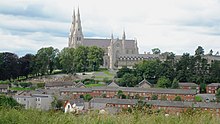Portal:Northern Ireland
In today's world, Portal:Northern Ireland is a topic that generates interest and debate in different areas of society. Whether due to its historical relevance, its impact today or its influence in the future, Portal:Northern Ireland is a topic that does not go unnoticed. From different perspectives and approaches, we have sought to understand and analyze Portal:Northern Ireland to understand its importance and consequences. In this article, we will explore different aspects related to Portal:Northern Ireland, from its origin to its relevance today, with the aim of providing a comprehensive view on this topic.
|
The Northern Ireland Portal
Introduction  Northern Ireland (Irish: Tuaisceart Éireann [ˈt̪ˠuəʃcəɾˠt̪ˠ ˈeːɾʲən̪ˠ] ⓘ; Ulster Scots: Norlin Airlann) is a part of the United Kingdom in the north-east of the island of Ireland that is variously described as a country, province or region. Northern Ireland shares an open border to the south and west with the Republic of Ireland. At the 2021 census, its population was 1,903,175, making up around 3% of the UK's population and 27% of the population on the island of Ireland. The Northern Ireland Assembly, established by the Northern Ireland Act 1998, holds responsibility for a range of devolved policy matters, while other areas are reserved for the UK Government. The government of Northern Ireland cooperates with the government of Ireland in several areas under the terms of the Belfast Agreement. The Republic of Ireland also has a consultative role on non-devolved governmental matters through the British–Irish Governmental Conference (BIIG). Northern Ireland was created in 1921, when Ireland was partitioned by the Government of Ireland Act 1920, creating a devolved government for the six northeastern counties. As was intended by unionists and their supporters in Westminster, Northern Ireland had a unionist majority, who wanted to remain in the United Kingdom; they were generally the Protestant descendants of colonists from Britain. Meanwhile, the majority in Southern Ireland (which became the Irish Free State in 1922), and a significant minority in Northern Ireland, were Irish nationalists (generally Catholics) who wanted a united independent Ireland. Today, the former generally see themselves as British and the latter generally see themselves as Irish, while a Northern Irish or Ulster identity is claimed by a significant minority from all backgrounds. The creation of Northern Ireland was accompanied by violence both in defence of and against partition. During the conflict of 1920–22, the capital Belfast saw major communal violence, mainly between Protestant unionist and Catholic nationalist civilians. More than 500 were killed and more than 10,000 became refugees, mostly Catholics. For the next fifty years, Northern Ireland had an unbroken series of Unionist Party governments. There was informal mutual segregation by both communities, and the Unionist governments were accused of discrimination against the Irish nationalist and Catholic minority. In the late 1960s, a campaign to end discrimination against Catholics and nationalists was opposed by loyalists, who saw it as a republican front. This unrest sparked the Troubles, a thirty-year conflict involving republican and loyalist paramilitaries and state forces, which claimed over 3,500 lives and injured 50,000 others. The 1998 Good Friday Agreement was a major step in the peace process, including paramilitary disarmament and security normalisation, although sectarianism and segregation remain major social problems, and sporadic violence has continued. (Full article...) Selected article -Armagh (/ɑːrˈmɑː/ ar-MAH; Irish: Ard Mhacha, IPA: [ˌaːɾˠd̪ˠ ˈwaxə], "Macha's height") is the county town of County Armagh and a city in Northern Ireland, as well as a civil parish. It is the ecclesiastical capital of Ireland – the seat of the Archbishops of Armagh, the Primates of All Ireland for both the Roman Catholic Church and the Church of Ireland. In ancient times, nearby Navan Fort (Eamhain Mhacha) was a pagan ceremonial site and one of the great royal capitals of Gaelic Ireland. Today, Armagh is home to two cathedrals (both named after Saint Patrick) and the Armagh Observatory, and is known for its Georgian architecture. Although classed as a medium-sized town, Armagh was given city status in 1994 and Lord Mayoralty status in 2012, both by Elizabeth II. It had a population of 16,310 people in the 2021 Census. (Full article...)Selected picture -Northern Ireland listsRelated portalsSelected biography - Patrick Bradley (born 23 May 1981) is an Irish sportsman who plays Gaelic football for John Mitchel's Glenullin and the Derry county team. With the county he has won two National League titles, and individually an All Stars Award for his performance in the 2007 All-Ireland Senior Football Championship (and has been nominated a further four times). With his club Bradley has won the Derry Senior Football Championship. He usually plays at full forward for both club and county. Bradley is regarded as one of the best forwards in Ireland, due to his accuracy in front of the posts with both left and right feet - from both open play and frees. (Full article...)Did you know (auto-generated) -
WikiProjectsThings you can do
TopicsCategoriesRecognized Content
Featured articlesGood articles
Featured listsAssociated WikimediaThe following Wikimedia Foundation sister projects provide more on this subject:
Northern Ireland on Wikipedia
Web resources
Discover Wikipedia using portals |









































